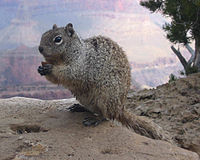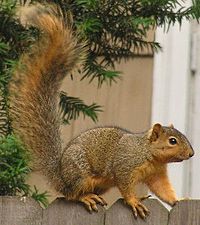Afghan flying squirrel
| Afghan flying squirrel | |
|---|---|
| Scientific classification | |
| Domain: | Eukaryota |
| Kingdom: | Animalia |
| Phylum: | Chordata |
| Class: | Mammalia |
| Order: | Rodentia |
| Family: | Sciuridae |
| Genus: | Eoglaucomys |
| Species: | |
| Subspecies: | E. f. baberi
|
| Trinomial name | |
| Eoglaucomys fimbriatus baberi (Blyth, 1847)
| |
| Synonyms | |
|
Hylobates baberi | |
The Afghan flying squirrel (Eoglaucomys fimbriatus baberi) is a subspecies of rodent in the family Sciuridae. It is endemic to Afghanistan.
Biology
[edit]The Afghan flying squirrel is not considered to be threatened to become an endangered species because it is widely distributed, it has a large population, and the population is not declining fast enough. The only threats that affect the Afghan flying squirrel are selective logging, modernization, hunting for the fur trade. It has a generation time of approximately 4 to 5 years, and it has up to two litters annually. It usually has 2 to 4 young.[1]
Location
[edit]The Afghan flying squirrel is known to be found in montane coniferous forests. The Afghan flying squirrel is native to the following countries:
- Afghanistan
- India
- Pakistan[1]
References
[edit]- ^ a b "Eoglaucomys fimbriatus". International Union for Conservation of Nature and Natural Resources. Retrieved 3 January 2013.
Notes
[edit]- Baillie, J. 1996. Hylopetes baberi[permanent dead link]. 2006 IUCN Red List of Threatened Species. Downloaded on 29 July 2007.
- Thorington, R. W. Jr. and R. S. Hoffman. 2005. Family Sciuridae. pp. 754–818 in Mammal Species of the World a Taxonomic and Geographic Reference. D. E. Wilson and D. M. Reeder eds. Johns Hopkins University Press, Baltimore.



